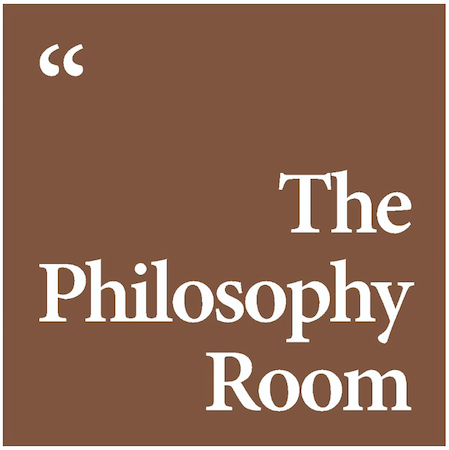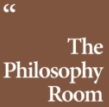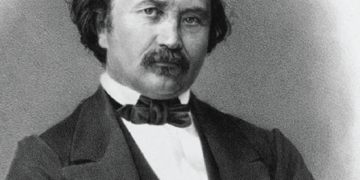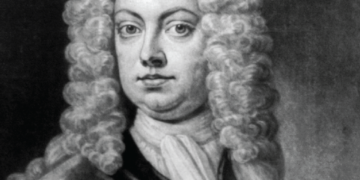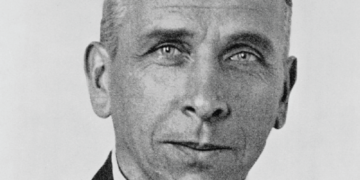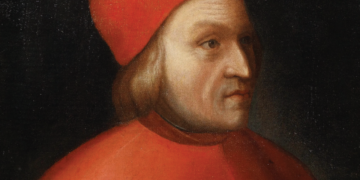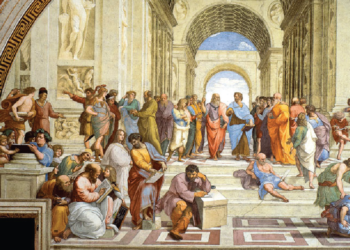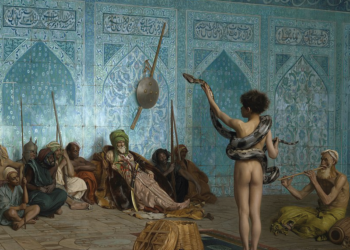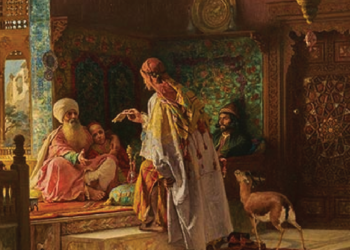Karl Kautsky
1) His Biography
Karl Kautsky was born on October 16, 1854, in Prague, then part of the Austrian Empire, into a culturally active family of Czech and German heritage. His father, Johann Kautsky, was a painter and set designer, while his mother, Minna Kautsky, was a writer and actress with deep sympathies for socialist causes. The family moved to Vienna in Kautsky’s youth, where he was exposed to a range of intellectual and political influences. He went on to study history, philosophy and economics at the University of Vienna, though he never completed a formal degree. His time at university, however, exposed him to the currents of thought that would shape his lifelong engagement with Marxism and socialism.
In the early 1880s, Kautsky became closely associated with the Social Democratic Party of Germany (SPD), which was then emerging as one of the most significant socialist movements in Europe. His encounter with Eduard Bernstein and later Friedrich Engels, Marx’s close collaborator, was instrumental in cementing his status within the Marxist tradition. Kautsky’s move to Zurich and subsequently to London allowed him to develop deeper relationships with the intellectual leaders of the movement. Engels, in particular, saw in Kautsky a capable interpreter of Marx’s theories and entrusted him with editorial responsibilities that would later elevate his influence within socialist circles.
By the late 1880s, Kautsky had emerged as one of the leading theorists of Marxist orthodoxy. He founded and edited the influential theoretical journal Die Neue Zeit (“The New Times”), which became the main platform for Marxist debate in the German-speaking world. Through his writings, he sought to elaborate and systematise Marxist theory in a manner that was both accessible and rigorous. His interpretations, often positioned as definitive, carried great weight within the SPD and other socialist organisations across Europe. Unlike some of his contemporaries, Kautsky advocated for a measured, evolutionary path to socialism, rooted in democratic institutions and parliamentary processes.
Kautsky’s prolific output during the late nineteenth and early twentieth centuries solidified his reputation as the “Pope of Marxism.” Among his most notable works from this period was The Erfurt Programme (1892), which outlined the SPD’s strategy and objectives and became a canonical text for social democratic movements. He also wrote extensively on the nature of capitalism, the role of class struggle, and the eventual transition to socialism. While committed to revolutionary principles in theory, Kautsky increasingly promoted a non-violent, legalistic approach to change—a stance that would eventually draw criticism from more radical Marxists.
During the early twentieth century, Kautsky found himself at odds with both the reformist and revolutionary wings of the socialist movement. He opposed Eduard Bernstein’s revisionist interpretation of Marxism, which downplayed the necessity of class struggle and the collapse of capitalism. Yet, he also became a fierce critic of Vladimir Lenin and the Bolsheviks, especially after the Russian Revolution of 1917. Kautsky believed that Lenin’s model of dictatorship and party control betrayed the democratic essence of Marxist socialism. His 1918 pamphlet The Dictatorship of the Proletariat was a scathing critique of Bolshevik methods and signalled a permanent break with the communist wing of the movement.
Following the First World War, Kautsky’s influence waned as the socialist movement fractured between reformist social democrats and revolutionary communists. Though he remained active in writing and political commentary, his insistence on democratic socialism was increasingly overshadowed by the polarising realities of post-war Europe. He lived in Vienna for much of his later life but was forced to flee to Czechoslovakia following the rise of Austrofascism in the 1930s. He then moved to the Netherlands, where he spent his final years in exile.
Kautsky died on October 17, 1938, in Amsterdam, just one day after his 84th birthday. Though largely marginalised by the ascendant communist movement of his time, his writings remained an essential resource for democratic socialists and historians of Marxism alike. His life spanned a critical era in European intellectual and political history, bridging the time of Marx and Engels with the turbulent rise of revolutionary socialism in the twentieth century. Even as he became a controversial figure in later years, Kautsky’s contribution to the development and dissemination of Marxist thought remains indisputable.
2) Main Works
The Erfurt Programme (1892):
This foundational text was co-authored by Kautsky and adopted by the Social Democratic Party of Germany (SPD) in 1891, becoming the most influential articulation of orthodox Marxism in the pre-World War I era. Kautsky’s commentary on the Erfurt Programme laid out a vision for socialism that combined historical materialism with political pragmatism. It underscored capitalism’s inherent contradictions and predicted its eventual collapse through the intensification of class conflict. The text maintained that socialism was not merely a utopian ideal but a scientific outcome of economic development, achievable through the mobilisation of the working class via democratic channels.
Kautsky’s emphasis was on the inevitability of socialism rather than its immediate implementation. He warned against opportunism but also rejected premature revolutionary adventurism. The Erfurt Programme became the theoretical backbone of social democratic parties throughout Europe and demonstrated Kautsky’s ability to simplify and communicate complex Marxist ideas to a broader political audience. Its combination of economic critique, class analysis, and tactical moderation made it a model for mass socialist parties that sought both electoral legitimacy and revolutionary transformation.
The Class Struggle (Erfurt Programme Explained) (1892):
This follow-up to the Erfurt Programme served as a popular commentary meant for the working-class readership. In it, Kautsky distilled the theoretical underpinnings of the Erfurt Programme into a more accessible format, allowing workers and activists to understand the goals and philosophical basis of the socialist movement. He elaborated on the historical development of class antagonisms, the role of the bourgeoisie and the proletariat, and the transformation of capitalism into socialism. The work stressed the importance of class consciousness, political organisation, and democratic struggle.
Through this text, Kautsky not only deepened the educational reach of Marxist theory but also reasserted the SPD’s role as both a political and pedagogical institution. His ability to popularise Marxism without diluting its essence helped solidify his position as the foremost interpreter of Marx and Engels in the pre-Leninist period. This work was translated into numerous languages and widely distributed among socialist circles across Europe and even beyond, marking it as a key vehicle for the international spread of democratic socialism.
The Road to Power (1909):
Published in a climate of growing social unrest and political polarisation, this work stands as one of Kautsky’s most powerful reaffirmations of revolutionary Marxism. Contrary to accusations that he had grown excessively reformist, Kautsky in The Road to Power emphasised the inevitability of revolutionary upheaval as capitalism reached its limits. He criticised the bourgeoisie’s increasing resort to authoritarian measures and warned that socialism would not come peacefully if democratic means were systematically blocked. He foresaw a moment when legal avenues would be closed off, making revolutionary tactics necessary.
However, even as he acknowledged the likelihood of revolution, Kautsky did not abandon his commitment to democratic methods and party discipline. He differentiated his approach from both reformist revisionism and the anarchic spontaneity favoured by some radicals. The Road to Power sparked intense debate within the SPD, as it appeared to signal a shift from gradualism to a more confrontational stance. It remains an important text for understanding the tensions within pre-war socialism between evolutionary and revolutionary strategies.
The Dictatorship of the Proletariat (1918):
Written in the wake of the Russian Revolution, this pamphlet was Kautsky’s sharpest critique of Bolshevism and marked his final rupture with the revolutionary Marxist left. Kautsky argued that the Bolsheviks, by abolishing democratic institutions and resorting to one-party rule, had betrayed the very ideals of socialism. For Kautsky, the dictatorship of the proletariat did not mean a literal dictatorship, but rather the democratic rule of the working class achieved through political participation and representative institutions. Lenin’s model, in contrast, represented to him an authoritarian perversion of Marx’s original intentions.
The work ignited a fierce polemic between Kautsky and Lenin, who responded with his own pamphlet The Proletarian Revolution and the Renegade Kautsky. Despite the controversy, Kautsky’s text became a reference point for democratic socialists seeking to distinguish themselves from the Soviet model. He insisted that socialism could only be legitimate if rooted in popular sovereignty, civil liberties, and pluralism. His critique foresaw many of the authoritarian traits that would come to define Soviet communism, lending this work enduring relevance in debates about democratic versus dictatorial socialism.
Foundations of Christianity (1908):
In this lesser-known yet intellectually ambitious work, Kautsky applied historical materialist analysis to the origins of Christianity. He argued that early Christianity arose not as a purely spiritual phenomenon, but as a socio-political movement among the oppressed classes in the Roman Empire. Drawing on the methods of Marxist historiography, Kautsky interpreted Christ and the early Christian communities as revolutionary figures who sought a radical transformation of the world in response to social injustice and imperial domination. Christianity, he contended, was originally a form of religious communism that had been co-opted by the ruling class.
This work displayed Kautsky’s range beyond party politics and his interest in applying Marxist theory to cultural and historical questions. It attracted both praise and criticism for its bold secularism and its demystification of religious origins. Although not as widely read as his political writings, Foundations of Christianity reveals Kautsky’s commitment to a comprehensive worldview grounded in historical materialism. It also anticipated later Marxist approaches to religion, making it a valuable contribution to the intersection of faith, class, and ideology.
3) Main Themes
Democratic Socialism and the Role of Parliamentarianism:
One of Karl Kautsky’s most enduring contributions to Marxist theory was his robust defence of democratic socialism through the mechanisms of parliamentary democracy. He advanced the idea that socialism need not arise from insurrection or violent revolution, but could and should be pursued through legal, electoral, and representative means. This theme played a defining role in his differentiation from both reformist revisionists like Eduard Bernstein and revolutionary Marxists such as Lenin. Kautsky believed that the working class, once organised through mass parties and trade unions, could attain political power through the ballot box and transform the state from within. The central aspect here is his trust in political institutions as viable instruments for revolutionary change, an idea that placed him in the lineage of classical Marxism while also shaping modern social democratic thought.
Kautsky’s theory of parliamentarianism revolved around the notion of historical development. He argued that capitalism inevitably leads to the creation of a politically conscious proletariat which, under the right conditions, would use the democratic framework of the bourgeois state to legislate socialism. His interpretation of Marxism therefore held faith in the continuity of the democratic process rather than its destruction—a vision directly opposed by Lenin, who dismissed parliamentary institutions as bourgeois illusions. This difference was not merely tactical but philosophical. Kautsky viewed democracy not as a temporary tool but as an intrinsic part of the socialist future. His insistence on civil liberties, pluralism, and political freedom marks a lasting legacy in European socialism, particularly within post-war social democratic movements that saw democracy and socialism as fundamentally compatible.
A further aspect of this theme lies in the international influence of Kautsky’s vision. While Lenin’s model found resonance in contexts of imperial collapse and state breakdown, Kautsky’s model found a home in stable democracies such as Sweden, Austria, and post-1945 Germany, where socialists implemented reforms through legislative action. His work thus helped shape the modern welfare state more than the revolutionary regimes his critics admired. Kautsky’s insistence that socialism be democratic and participatory remains a vital contribution, particularly in contrast to those who subordinated democratic principles to ideological purity or vanguardist control.
Historical Materialism and Scientific Socialism:
Another central theme in Kautsky’s work is his commitment to historical materialism as both method and worldview. He extended Marx and Engels’ materialist conception of history by emphasising the deterministic progression of economic development. For Kautsky, history was driven by material conditions and class struggle, culminating in the transition from capitalism to socialism. His writings present this evolution not as a matter of moral imperative but of scientific necessity, rooted in objective historical forces. This approach grounded the socialist project in empirical analysis rather than utopian ideals, distinguishing it from earlier forms of socialism and religious reformism.
The first key aspect of Kautsky’s application of historical materialism is his interpretation of capitalism’s internal contradictions. Like Marx, he saw the concentration of capital and the immiseration of the proletariat as driving forces of historical change. But unlike thinkers who focused on the moral or ethical shortcomings of capitalism, Kautsky placed emphasis on the structural inevitabilities of the system’s demise. This gave his socialism a predictive and analytical dimension, reinforcing its claim to scientific legitimacy. He opposed both Bernstein’s revisionist dilution of this principle and the voluntarist, will-driven interpretation of history found in Leninism, which Kautsky believed risked becoming idealist in form.
Kautsky’s use of historical materialism extended beyond economics into cultural and religious domains. In works like Foundations of Christianity, he applied Marxist analysis to early Christianity, arguing that religious ideologies themselves arise from material struggles and social contexts. This broadened the scope of historical materialism, pushing it beyond factory floors into the intellectual and spiritual life of civilisations. In this, he anticipated later thinkers such as Antonio Gramsci, who would also explore how ideology functions within material systems. Kautsky’s effort to universalise historical materialism—while maintaining its scientific core—demonstrated his originality and analytical ambition.
A third dimension was his insistence that socialist theory must rest on empirical observation and historical analysis, not metaphysical speculation. In this regard, Kautsky stood closer to Marx than many of his contemporaries, insisting that political strategy must be derived from material conditions rather than ethical exhortation or voluntarism. His commitment to historical materialism as a total system of thought remains a vital, if often overshadowed, pillar of classical Marxism.
The Proletariat as Historical Subject:
For Kautsky, the working class was not only the main victim of capitalist exploitation but also the prime agent of historical transformation. He saw the proletariat as the unique bearer of universal interests, capable of overcoming class division and leading society towards socialism. His writings consistently framed the proletariat’s rise to power as historically necessary and ethically desirable. This theme intersected deeply with both his theoretical writings and his political strategy, which revolved around the building of mass working-class organisations and parties.
He argued that the working class could not spontaneously generate a revolutionary worldview; instead, socialist consciousness had to be introduced from outside by educated cadres, particularly through parties and unions. This idea was later echoed by Lenin in What Is to Be Done?, although Lenin took it in a far more authoritarian direction. Kautsky envisioned a pedagogy of the masses through education, agitation, and press activity, not through the coercive imposition of ideology. His belief in enlightenment rather than imposition marked a democratic difference from later revolutionary models.
Another important element lies in Kautsky’s faith in the collective capacity of the working class to reshape the state. He did not see the proletariat as a homogenous or mechanical force, but as a subject formed and transformed through struggle. His writings stress the need for political organisation, discipline, and class unity, but always within democratic and pluralistic frameworks. Unlike anarchists who rejected institutional mediation, or Leninists who imposed centralised authority, Kautsky believed in the gradual self-emancipation of the working class through institutions that it would come to dominate democratically.
Kautsky viewed the working class not simply as a national category, but as an international force whose liberation would benefit all of humanity. In this, he remained faithful to the spirit of the Communist Manifesto and sought to promote international solidarity. However, his universalism came into conflict with the national particularisms and revolutionary vanguardism that rose in the early twentieth century. Nonetheless, his emphasis on the proletariat as a subject of human emancipation—educated, organised, and internationalist—remains one of his most enduring theoretical contributions.
Anti-Revisionism and the Defence of Orthodoxy:
A fourth major theme in Kautsky’s thought is his role as the principal defender of Marxist orthodoxy against revisionist tendencies. His debates with Eduard Bernstein are particularly emblematic of this stance. Bernstein’s Evolutionary Socialism proposed a departure from Marxist doctrine, advocating for reform over revolution, and suggesting that capitalism was more adaptable than previously thought. Kautsky responded by defending core Marxist principles such as the necessity of class struggle, the inevitability of capitalist crisis, and the revolutionary role of the proletariat.
A key aspect here is the methodological difference between Kautsky and the revisionists. Bernstein emphasised moral development and social ethics, seeing socialism as a goal of justice rather than necessity. Kautsky, by contrast, saw socialism as grounded in objective economic forces. This clash was not only theoretical but strategic, as it concerned how socialists should behave within bourgeois democracy. While Kautsky accepted democratic engagement, he rejected the idea that socialism could simply evolve from capitalism without significant rupture. This placed him in a middle position—rejecting Bernstein’s gradualism while still opposing Lenin’s violent rupture with liberal institutions.
Another dimension was Kautsky’s concern with party discipline and unity. He feared that revisionism would lead to ideological fragmentation and political disorientation. To this end, he helped to establish a doctrinal centre for the SPD and the Second International, ensuring that Marxism retained a coherent identity amid growing pressure from liberal, nationalist, and religious currents. In this sense, he functioned as a guardian of tradition, preserving the intellectual coherence of Marxism at a time when it faced erosion from within and persecution from without.
While critics often charge Kautsky with rigidity, his insistence on fidelity to Marxist categories also ensured the survival and transmission of Marxist theory across generations. His orthodoxy was not mere dogma but a response to the risks of dilution and opportunism. In defending Marxist principles against revision, Kautsky provided the movement with a durable intellectual scaffold, even if his own positions were later eclipsed by more radical ideologies.
Critique of Bolshevism and the Problem of Dictatorship:
In the wake of the Russian Revolution, Kautsky argued forcefully that the Leninist model had replaced workers’ democracy with a centralised autocracy. His pamphlet The Dictatorship of the Proletariat insisted that socialism without democracy was a contradiction in terms. For Kautsky, the dictatorship of the proletariat was meant to reflect a majority rule by workers, not the imposition of one-party control.
Kautsky warned that eliminating pluralism, civil rights, and electoral competition would not lead to liberation but to a new form of domination. He saw the Bolsheviks’ closure of the Constituent Assembly and suppression of dissent as signs of a counterrevolutionary tendency disguised as radicalism. Unlike Lenin, who viewed the state as a temporary apparatus of class domination, Kautsky believed that a socialist state should immediately be more democratic than its bourgeois predecessor.
While not a pacifist, Kautsky believed that political power derived from legitimacy, not coercion. He saw the Bolsheviks’ reliance on terror and repression as a betrayal of Marxist humanism and a dangerous precedent for the future of socialism. In this regard, his views aligned more with later thinkers such as Rosa Luxemburg, who also defended the necessity of free debate within the socialist movement.
Kautsky’s warnings were tragically prescient. The centralised authoritarianism he criticised in Lenin’s regime eventually crystallised into the totalitarianism of Stalinism. Although he was dismissed as a “renegade” in Soviet historiography, Kautsky’s critique remains essential for understanding the internal contradictions of twentieth-century socialism. His call for a socialism based on democracy, freedom, and participation offers a compelling alternative vision that continues to resonate with democratic leftists and critics of authoritarian socialism alike.
4) Kautsky as Communist
Karl Kautsky’s relationship to communism is a subject marked by paradox and shifting interpretations. Often dubbed “the Pope of Marxism” before the First World War, Kautsky was considered the most authoritative interpreter of Marxist theory within the Second International. Yet, after 1917, especially in Soviet discourse, he came to be vilified as a “renegade” and a bourgeois reformist. This dramatic shift in reputation reflects not a simple betrayal of communism on Kautsky’s part, but a deep divide in what “communism” meant in theory and practice. Kautsky considered himself a committed Marxist revolutionary; however, his conception of revolution was rooted in democracy, legality, and mass participation—not in insurrectionary violence or dictatorship. His vision of communism, therefore, was substantially different from that of Lenin and the Bolsheviks, though it remained within the Marxist tradition.
Kautsky’s communism was anchored in the classical Marxist idea of a proletarian revolution arising from the contradictions of capitalist development. He argued that capitalism’s own laws of motion would bring about its downfall and that the working class, through its growing organisation, would seize political power to usher in socialism and ultimately communism. Unlike utopian socialists or anarchists, Kautsky maintained that this process was historically determined and had to unfold in accordance with specific material and political conditions. In this sense, he saw himself not as a moderate, but as a patient revolutionary, committed to the long-term scientific realisation of communism. His understanding of communism emphasised the eventual abolition of class divisions, collective ownership of the means of production, and the flourishing of human freedom through democratic institutions.
A core aspect of Kautsky’s communist orientation was his emphasis on historical materialism as a method. He did not treat communism as a moral imperative or a set of ethical values, but as the necessary outcome of historical development. This commitment separated him from contemporaries like Eduard Bernstein, who redefined socialism as a set of ethical aims to be pursued within capitalism. Kautsky rejected this, insisting that socialism—and by extension, communism—could not simply be voted into existence without a fundamental transformation of the economic structure. In his debates with revisionists, he presented communism not as an ideal to aspire to but as a scientifically grounded process unfolding through the dialectics of history. His conception of the communist future retained the classical Marxist belief in abundance, freedom, and collective rationality.
Nevertheless, Kautsky’s communism was distinct in its deep commitment to democracy. Unlike Lenin, who saw the revolutionary moment as requiring a vanguard party and the suppression of political opponents, Kautsky held that the dictatorship of the proletariat must itself be democratic in form. He argued that true communism could only flourish in an environment of civil liberties, political pluralism, and mass participation. In his The Dictatorship of the Proletariat (1918), he directly opposed Lenin’s authoritarianism, arguing that the Bolshevik regime had substituted a party dictatorship for the rule of the working class. For Kautsky, this was not communism but a betrayal of it. His critique was not grounded in liberalism, as some claimed, but in a Marxist humanist commitment to freedom and democracy as integral to any genuine communist society.
In terms of original contributions, Kautsky’s communism was shaped by a methodical attempt to codify and systematise Marxist theory. He played a pivotal role in clarifying the stages of revolutionary transition—from capitalism to socialism to communism—and in asserting that this path must involve the winning over of the majority. His influence was profound in the formation of social democratic parties throughout Europe, many of which saw no contradiction between democratic processes and communist ends. However, the rise of Bolshevism—and later Stalinism—cast his model into the shadows. His rejection of Leninist strategy was seen as out of touch with the needs of revolution in the peripheries, particularly Russia, where the bourgeois-democratic phase had barely begun.
Kautsky’s divergence from Bolshevik communism brought him into comparison with other Marxist thinkers such as Rosa Luxemburg and Antonio Gramsci. Luxemburg, while sharing Kautsky’s criticism of Bolshevik authoritarianism, was more willing to endorse spontaneous revolutionary uprisings and saw greater potential in mass movements. Gramsci, for his part, moved away from Kautsky’s economic determinism, introducing the concept of cultural hegemony to account for capitalist resilience. Yet even these thinkers, despite their disagreements, did not wholly reject Kautsky’s influence. His early writings laid the foundation for a rigorous and coherent Marxist theory that later figures would adapt rather than discard.
5) His Legacy
Karl Kautsky’s legacy is multifaceted, shaped by both his pivotal role in the development of Marxist thought and his complicated relationship with the broader revolutionary movements of the 20th century. In many ways, Kautsky’s legacy as a Marxist theorist can be considered as both foundational and contradictory. His early work was crucial in establishing the theoretical framework for socialist movements in Europe, and his influence helped shape the character of social democracy during the late 19th and early 20th centuries. However, his eventual divergence from the Bolshevik conception of Marxism, especially after the Russian Revolution of 1917, led to his ideological marginalisation within the socialist and communist traditions. This tension—between his theoretical contributions and the political trajectory he advocated—has left Kautsky with a legacy that is continually reassessed in light of changing political contexts and interpretations.
Kautsky’s most significant legacy lies in his interpretation of Marxism as a scientific theory of history. His works, such as The Theory of Capitalist Development, offered a detailed analysis of capitalist economics and the historical development of class structures. In this regard, Kautsky contributed to the solidification of Marxist economics as a discipline, ensuring that the focus on class struggle, material conditions, and historical development remained central to socialist thought. He was particularly adept at making Marx’s ideas accessible to a broader audience, providing intellectual clarity that helped form the basis for the intellectual legitimacy of socialist movements across Europe. For Kautsky, Marxism was not simply a set of revolutionary ideas but a scientific method for analysing society’s development, especially in terms of economic production and class relations. His approach provided an intellectual bridge between the revolutionary zeal of the early Marxists and the more gradualist and reformist agendas that would later dominate European socialist movements.
In the realm of political thought, Kautsky’s insistence on the necessity of democratic processes within socialism marked a significant departure from more authoritarian strands of Marxism. His belief that socialism and later communism should be democratic and based on the active participation of the working masses became a cornerstone of the social democratic tradition. His critiques of the Bolshevik coup and the subsequent authoritarian practices of the Soviet Union positioned him as a staunch defender of political pluralism and individual rights within socialist revolutions. While this stance made him a target of Bolshevik ire, it also ensured his influence among Western socialist and labour movements, particularly in Germany and Austria. Social democratic parties, which in many countries became the dominant form of socialist politics, were often aligned with Kautsky’s principles of achieving socialism through democratic means, rather than through violent revolution or the dictatorship of a vanguard party.
However, Kautsky’s later works, especially his critique of the Russian Revolution and the rise of Stalinism, tarnished his reputation within the Soviet Union and among many communists. His opposition to the Bolsheviks’ abandonment of democratic socialism and his rejection of Lenin’s centralised authority were viewed as a betrayal by many Marxists who saw in the Bolshevik revolution the realisation of Marx’s ideas. As the Soviet state grew increasingly centralised and authoritarian, Kautsky’s warnings against the dangers of one-party rule seemed prescient, but they also contributed to his marginalisation within the broader communist tradition. His name became synonymous with the term “renegade” in Soviet discourse, a label that overshadowed his earlier intellectual contributions for many decades. Yet, his critiques of Soviet authoritarianism remain relevant for contemporary Marxist and socialist debates, especially regarding the tension between revolutionary theory and the practical realities of socialist governance.
Kautsky’s writings on imperialism, especially in Imperialism: The Highest Stage of Capitalism, laid the groundwork for later critiques of colonialism and global capitalism. While Kautsky was not as revolutionary in his approach to imperialism as figures like Lenin, his analysis of the economic underpinnings of imperialism and the relationship between capitalist development and global exploitation was highly influential. His ideas helped to shape the political discourse of anti-imperialist movements, particularly in the early 20th century, although they were later overshadowed by more radical critiques. Nonetheless, his framework for understanding imperialism provided a foundation for Marxist theorists to examine the global expansion of capitalist systems and its impact on colonised regions. In this sense, Kautsky’s legacy extends beyond Europe, influencing a global movement of anti-colonial resistance.
In the post-World War II era, Kautsky’s legacy became subject to varying interpretations. While his commitment to democratic socialism continued to resonate with social democratic parties, his criticisms of Bolshevism were often seen as outdated or irrelevant in the context of the Cold War’s geopolitical divisions. The polarisation of world politics between the Soviet bloc and the Western capitalist powers cast Kautsky’s moderate, democratic socialism in a somewhat unfavourable light. Nevertheless, his theoretical works remained influential in shaping the intellectual currents of European socialism, particularly in relation to debates on the nature of the state, the role of democracy in socialism, and the future of class struggle. His critiques of authoritarian socialism and his emphasis on political freedom within the socialist movement found renewed relevance in the later 20th century, especially with the decline of the Soviet Union.
Kautsky’s legacy in the contemporary world is experiencing a revival, particularly in the context of debates over the future of socialism in the 21st century. As the global capitalist system faces increasing crises, the relevance of Kautsky’s democratic Marxism is being re-examined by modern socialists, especially those seeking alternatives to both neoliberal capitalism and authoritarian state socialism. Kautsky’s insistence on democratic participation, his opposition to bureaucratic centralism, and his commitment to a scientifically grounded Marxism offer a framework for those searching for a new vision of socialism in a rapidly changing world. His emphasis on the gradual and democratic nature of socialist change resonates with the contemporary need for a more just, inclusive, and participatory political system.
